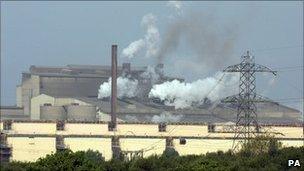Tata £53m in steel 'steam' power in Port Talbot
- Published
Tata Steel says it is to invest £53m in cutting the power needed by its steel-making plant in Port Talbot.
The firm, which employs around 7,500 people in Wales, said the energy saved would be enough to power 20,000 homes.
A new cooling system will create steam, allowing the plant to generate up to 10 MW of electricity, it said.
The steel-making firm said the work will be carried out in the second half of 2012. The firm is also rebuilding the plant's No 4 blast furnace.
Tata said the new cooling system would cut the Port Talbot Basic Oxygen Steelmaking (BOS) plant's power demand by about 15%.
Last year the firm finished £60m project to reduce the BOS plant's C02 emissions by using new energy management technology.
Jon Ferriman, director of Tata Steel's UK Strip Products business, said: "This project makes further advances towards our vision of becoming self-sufficient in energy, and also further improves our environmental performance. "

A new cooling system at the steel-making plant will create steam from which electricity will be generated
He said the evaporative cooling system would improve Port Talbot's productivity and energy efficiency.
"We will also build on the ability to recycle and reuse process gases that our Energy Recovery plant brought us," added Mr Ferriman.
Tata Steel Europe managing director and chief executive officer Karl-Ulrich Köhler said: "This investment is a further demonstration of Tata Steel's commitment to make our steel operations in Wales a benchmark for the European industry."
David Ferris, chairman of the multi-union in Port Talbot, said: "This investment is another massive vote of confidence for the commitment and expertise of our employees in Wales, and represents an important building block in securing a sustainable steel industry in Wales."
Neath Port Talbot Council chief executive Steve Phillips said it was "excellent news" and the council supported the company's efforts to generate more of its own electricity.
"This investment will secure jobs for the future, benefitting local communities and small businesses," said Mr Phillips.
- Published30 March 2011
- Published24 March 2011
- Published12 October 2010